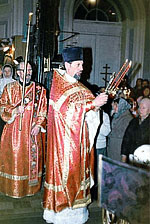Special Days of Easter

The Christian celebration-of Easter is really a season of
special days pointing to the death and Resurrection of Jesus Christ. As
people from many lands became believers in Christ, they each added unique
touches to this season called Lent.
Lent is a period of fasting, or doing
without certain foods. Not counting Sundays, Lent is the forty days before
Easter.
Many Christians fast during this time to remind themselves of the
forty days Jesus fasted in the wilderness.
Several countries have
celebrations just before Lent begins. In England, Shrove Tuesday is the
name given to the last day before Lent. On this day, many people make
pancakes in order to use up all their eggs, butter, and milk before it is
time to fast.
In other countries, the last few days before Lent are filled
with parties, masquerade balls, parades, festivals, and in some places,
fireworks displays. This period of celebration is often called Carnival.
In Europe, Carnival is held in Norway, Switzerland, France, Italy, Spain,
Germany, Portugal, and Greece. Carnival is also held in almost all of the
countries in Central and South America, as well as in the islands of the
Caribbean and in Cuba.
In the United States, Carnival is held in very few
places; among those the most famous is in New Orleans, Louisiana. The
French settled New Orleans, and in their language, Mardi Gras means "Fat
Tuesday." Their Carnival begins six days before Lent and ends with a Mardi
Gras festival involving tens of thousands of people and a parade of
colorful floats, bands, and marching units.
Ash Wednesday is the first day
of Lent. On this day, many Christian churches have a special service of
prayer, during which the priest or minister may sprinkle ashes upon the
heads of the people or make a small cross of ashes on the forehead of each
worshipper.
On Ash Wednesday in many countries, people make and eat
pretzels. The word pretzel comes from a Latin word meaning "little arms."
The shape of the twisted pretzel is meant to remind people of arms folded
in prayer.
Palm Sunday
marks the beginning of Holy Week. On this day, early Christians carried
palm branches to church remembering how Jesus was welcomed to Jerusalem on
the first Palm Sunday.
Since medieval times, palm leaves have been twisted
into cross shapes and given to Christian worshipers on Palm Sunday. On the
Ash Wednesday of the following year, these shapes are brought back to
church, burned to ash, and used by priests during church services. Palm
leaves are also used in Jewish services during Passover.
The Latin
American countries often have huge parades on Palm Sunday, featuring tall
statues of Jesus and Mary which are sometimes so heavy that it takes
dozens of men to carry each one!
In many countries, palm branches are used
to decorate churches. In countries where palms are not available, willow,
myrtle, bay, pussywillow, olive, or boxwood branches are used instead.
Children in Austria hang pretzels on their palm branches. And in Finland,
children used to cut willow branches early on Palm Sunday and lightly
switch the women in their neighborhood for good luck!
The Thursday before Easter
is called Maundy Thursday. The name Maundy comes from a Latin word which
means command. It refers to the new commandment Jesus gave his disciples
on the Thursday before he was crucified. On that night long ago, he served
their Last Supper of bread and wine, washed his disciples' feet, and said,
"A new command I give you: Love one another. As I have loved you, so you
must love one another." John 13:34
As a reminder of these things,
Christians often re-enact the acts of foot washing and serving communion
on Maundy Thursday.
During the Middle Ages, people rang church bells all
during Maundy Thursday services, and then silenced the bells until Easter
Eve. Spring cleaning, a custom associated with the return of warmer
weather, pre-dates Christ, but is another tradition adopted by Christians
and practiced on Maundy Thursday. In preparation for Easter Sunday, people
of long ago spent this day washing and sweeping their homes and carefully
cleaning their bodies as well. In Russian it called "Clean Thursday"
Another interesting custom traced to the
Middle Ages is the wearing of green and eating of only green foods on this
day. For this reason, it is still called "Green Thursday" in many parts of
Europe, and salads and greens are a favorite menu. In Austria, people use
and eat only green eggs on this day!
Good Friday used to be called God's
Friday because it was the day Jesus was crucified. This is the most solemn
day of the year for Christians as they recall the suffering and death of
Jesus.
In past times, there were many superstitions connected with Good
Friday.
Miners were afraid to go down into the mines because they thought
the earth was cursed on that day when Jesus was laid in the tomb.
Blacksmiths refused to pound a nail because nails were used in the
crucifixion.
And many housewives thought it was bad luck to wash clothes
on Good Friday because Christ had been wrapped in linen cloths on this
day.
Farmers, however, believed seeds planted on Good Friday would yield
wonderful crops.
Some people collected water in containers on this day
because they thought it could cure eye diseases!
The Bible says that when
Jesus hung on the cross, the sky became dark from noon until three o'clock
in the afternoon. Long ago, Christians held quiet church services during
these three hours on Good Friday. Statues and pictures of Christ were
draped in black cloth and prayers were offered for forgiveness of sins.
The special devotion called the "Stations of the Cross" was started during
the Crusades six hundred years ago. Pictures or statues were placed along
a city street. Each one was called a "station" and showed a different part
of Christ's trial, death, or burial. Christians walked from station to
station, reciting prayers at each one.
Today many Protestant and Catholic
churches hold Good Friday services from noon until three, and almost all
Catholic churches are decorated with pictures or statues depicting the
stations of the Cross.
Long before Jesus' time, the Celts made and ate
sweet cakes or rolls to enjoy at their springtime celebrations. With the
spread of Christianity, many people no longer believed in the old gods of
the sun and the seasons, but they still loved to eat their delicate sweet
breads in the spring.
Since long ago, people in Great Britain have enjoyed
the traditional Good Friday breakfast of hot cross buns. They are marked
with a white icing cross to remind people of Christ. When street vendors
sold their wares in London, they sang a song that has become a favorite
nursery rhyme for children:
Hot cross buns! Hot cross buns! One a penny,
two a penny, hot cross buns! If you have no daughters, give them to your
sons, One a penny, two a penny, hot cross buns!
Easter Eve is a time of interesting extremes. In many
European countries, people have solemn candlelight services. In other
countries, such as Italy and Spain, and those in Latin America, the day is
filled with the noise of bands playing and people singing. As the sun sets
and the sky darkens, huge firework displays explode, cannons fire, bells
ring, and whistles blow. The noisy celebrations express the joy people
feel as they anticipate Jesus' Resurrection.
In countries of Northern Europe, such as Norway and Sweden, huge bonfires blaze in the Easter Eve
darkness. It is said that people who thought lighted fires in the spring
thousands of years ago they could help heat up the earth after the long,
cold winter. Now, however, these fires symbolize the coming of Christ, and
often burn until the sun comes up on Easter morning.
For many, Easter
Sunday begins in the pre-dawn darkness as they wait for the first rays of
sun to lighten the Eastern sky. In ancient times, the sun was worshiped as
the giver of life, and when the darkness of winter ended, many people
believed that the sun danced in the sky. For this reason, they gathered on
hilltops to watch the sun rise on the first day of spring each year.
As
Christianity spread throughout the world, people saw Christ as the giver
of life and turned from worshiping the sun to honoring him. As they
recalled the story of the women coming to Christ's empty tomb at dawn,
believers thought of the sunrise on Easter as a symbol of the
Resurrection.
Easter Sunday is the most joyful of all Christian
celebrations. All over the world, Christians gather at dawn to greet the
rising sun with the victorious cry, "Christ is risen!" Long ago in France,
people gathered outside to watch for the first sunbeams of Easter,
believing that they were God's angels dancing for joy.
An old Irish custom
was to hold a dance contest as the sun rose on Easter morning. The men
danced and women baked a cake to be used as a prize for the winner. It is
thought that the expression "he takes the cake" comes from this old Irish
tradition.
In early America, Easter services were very simple, reflecting
the Puritan or Quaker heritage of many of the early settlers. Today,
however, Easter services are elaborate and often feature huge choirs and
even pageants or plays depicting parts of the Easter story .
One of the
largest Easter services is in Rome at St. Peter's Square. Thousands of
people gather from all over the world to hear the Easter message given by
the Pope, the leader of the Catholic church.
On Easter morning, churches
everywhere are decorated with beautiful flowers and their choirs sing
great cantatas like Handel's Messiah. People wear their new clothes for
Easter Sunday services in honor of the new life they have in Christ.
Churches are often completely full as members come together to rejoice and
to offer praise to God. The sadness of Good Friday disappears as people
remember the Resurrection of Jesus Christ and his promise of eternal life.
|









